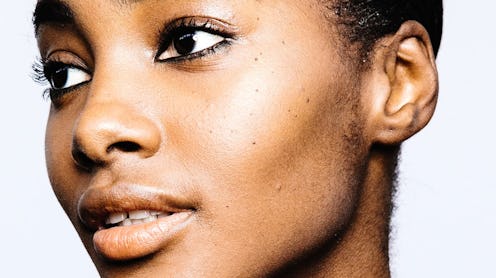(Beauty)
The Difference Between Black & Very Black Mascara (Because Yes, There Is One)

Think back to the last time you went mascara shopping. After plucking your lash-booster of choice from the shelves, you undoubtedly faced a dilemma — which shade to go with. Because there is a difference between black and very black mascara. And soft black. And brown black. And any other name allotted by the beauty industry, whether you can really see it with the naked eye or not.
And it can feel like the variations on the shade are endless, too, although according to Dr. Rocio Rivera — VP of Scientific Communications at L’Oréal Paris — their brand typically sticks to a trio. "Most of the time there are three: Soft black, black, and blackest black, but it really depends on the product," she explains. There are exceptions to this rule, though; for instance, L’Oréal Paris just launched the Bambi Eye Mascara in Extra Noir this July.
"To get different levels of blackness, we have to change the level of pigment — it is quite an art. For a soft black we can also add a little touch of white pigment," Dr. Rivera continues, noting that L'Oréal Paris primarily uses mineral black iron oxide to give its mascara shades their dark color. "Bambi Extra Noir Mascara’s formula contains ultra-black pigments for an intense look, as well as pearls to add reflect and luminosity."
But how does the visual look of the mascara differ between these shades? "Mascaras are available in many colors, but the most common are black and very black. Black mascara gives a gentler, subtle look, and very black mascara gives an almost liquid ebony look," explains Louise-Maria Hahn, Senior Product Manager at essence Makeup. "Black mascara is a simple black, with some having tints of brown, gray, and deep blue or purple. Very black mascara is strictly black; it has no other tint visible."
Both Hahn and Dr. Rivera agree that mascara shade ranges can be inspired by shoppers' desire for subtler colors during the day, versus the going-out, dark-as-can-be lashes reserved for nighttime. Or, you might forgo straight black mascara entirely while it's still sunny out: "Many women choose brown mascara for the day for a more natural look," says Dr. Rivera.
"It is a fashion trend to wear lighter and black mascara for day wear to give a more natural and light look, and very black mascara in the evenings to give a more mature, grown-up, and darker look. Very black mascaras are used to give a 'smoky look'," adds Hahn. "It is usually worn to give a more seductive look and to make the eyes look the most prominent in the whole face, which makes the eyes the primary focus of attention."
There you have it. While the verbiage might change — extra noir, very black, etcetera — the intention remains the same. Ahead, a few favorite extra-dark mascaras.
We only include products that have been independently selected by The Zoe Report's editorial team. However, we may receive a portion of sales if you purchase a product through a link in this article.
This article was originally published on